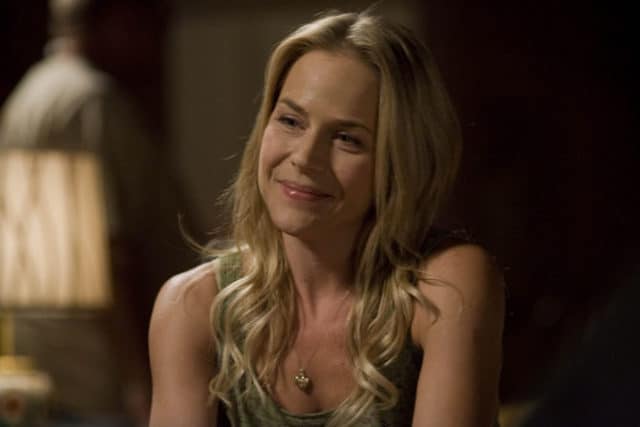
The idea of compiling a list of tragic TV deaths is nothing new. The idea of taking a closer look and finding out why these deaths affect us the way they do is more important. We don’t care if someone dies in TV programs if we could care less or if we can’t wait for someone to finally end our suffering, having to see them in the next episode week after week. Good writing and acting ought to make us care, otherwise, why bother watching?
Deaths on this list come in many shapes and sizes. Some are classic, some are new, and a few you may not even consider to be tragic. As you go through this list, look for different ways to view the shows and their characters who set them up for the kill.
Teri Bauer, 24
Many viewers were outraged at the death of Teri Bauer, Jack’s wife, at the end of the first season. According to the writers, she had to die because it set the tone for Jack’s character for the rest of the series — which was an unqualified success. Jack is driven by revenge, anger, and a personal life that no matter what he does, never ends up with a happy ending. What makes her death worse is that she was made of sterner stuff, a quality that would fit into the personality of someone Jack would marry. Killing her off at the end of the season made no sense to us. It was rumored that the writers tried to find a way to write her into season two because of the blowback, but had no good way to do it.
Walter White, Breaking Bad
In an interview with Bryan Cranston after the series ended, he was asked whether there was a possibility for Breaking Bad to get revived. He quipped, “You didn’t actually see Walter White die, did you?” We didn’t want him to die at the end of the series, yet his death could be reasonably expected. He tied up most of his loose ends before he went to rescue Jesse, but many of us were looking at the possibility of A&E wouldn’t end a series that had a growing viewership even at the end. The tragedy of his death was that the Breaking Bad series would be no more.
Seymour, Futurama
The clip selected for this death is really the only way to completely understand the sadness that accompanies Seymour fading away within a few minutes on screen. Being abandoned and patiently waiting for Fry to return, we find that Fry believes Seymour has totally forgotten about him. The opposite is the truth, and we sense the loneliness and abandonment everyone fears and most people experience at some time in their life. Seymour gets fed and also gets some attention, but he knows and we know it is not enough. For people who have owned a pet, it only makes this death worse.
Edith Bunker, All in the Family
If this TV show is a bit retro for you, take a minute and just take a video clip or two to get the sense of who Edith Bunker is. You will get a better sense of this video and her death. The grief felt by her overbearing husband Archie is done with few words and a tragic dose of silence. Those who have lost someone dear to them know the difficulty of explaining the loss or the feeling of the loss. This is what makes this death so tragic, as Archie says in the clip. The adage that you don’t know what you have until you lose it is performed superbly here.

Alexandra Borgia, Law and Order
Law and Order has had many Assistant District Attorneys pass through its doors over the years, but Borgia is the only one that was hunted own and murdered. ADA Kincaid was killed off in the early years of the show by a drunk driver, but Borgia’s shocking ending was something few people expected. Her body was found bound and gagged in the back of a car, and the cause of death was she choked on her own blood. Throughout the series, McCoy and the ADAs in general often bully their suspects and end up winning, but this murder of Borgia was a direct act of retribution.
Dr. Sweets, Bones
Dr. Sweets didn’t get his character name by accident. As season 10 of the series gets revved up, it seems his personal life is working out as it was announced him and romantic interest Daisy had gotten married during the off-season. His character brought some comic relief to the series, a great way to lighten the mood and break up the tension during episodes. If this was his main role, why did he have to be killed off so tragically, especially considering his recent announcement about him and Daisy? Though the actor, John Francis Daley, was leaving the series to move on to other opportunities, Sweets deserved a more noble, and perhaps, comic ending to his character.
Colonel Blake, M*A*S*H*
This is another retro pick, and what makes this death so tragic is that it altered the course of the show permanently. Colonel Blake was killed off so he could never return. Behind the scenes, the reason was that McLean Stevenson who played the role of Blake realized the central character for the future of the series would be Hawkeye Pierce, played by Alan Alda. Stevenson had said he could not accept being anything less than the number one character on the show, so he left after fulfilling his contract. The actors were not given the script of the last scene until right before shooting. Two deaths actually took place here: the death of Colonel Blake and the end of Stevenson appearing on the show at any point in the future.
Opie, Sons of Anarchy
The death of Opie can be described as either “loyalty sucks” or “the sacrificial lamb.” If there is one major characteristic of Opie it is loyalty. When Jax does not want to choose another brother to exchange for the lives of two others, he volunteers himself. Opie takes the choice away from Jax by punching one of the sergeants, who makes the decision himself. Locked in a room against 4 men, one who was given a pipe, Opie puts up a good fight but is worn out by the 4 on 1 battle. On his knees and looking at Jax, his head is crushed from behind by a blow from the pipe. Loyalty is supposed to be rewarded, not punished, and this contradiction makes this all the more tragic.
Bobby Simone, NYPD Blue
Actor Jimmy Smits was moving on to greener pastures, but for the fans of NYPD Blue he would be one of the all-time favorite characters. Because of contractual obligations, the writers decided to drag the beginning and end of his death over a three week period. Fans slowly saw their favorite cop deteriorate, and it became clear there was no turning back. The episode where he finally passes away in a hospital bed is one of the most emotional moments on TV. Similar to Seymour, viewers witnessed someone slowly deteriorating, and at the end his closest friends and partner had already shared their feelings about what was going to happen. It’s one of those scenes where you think that life is just unfair, no matter how good you are.
Susan Biddle Ross, Seinfeld
The death of Susan Ross would be the last and likely the most controversial episode written by Larry David. Susan Ross was the fiancée of George, who he had regrets about getting married to from the beginning but was too much of a coward to break off the engagement. The time came to send out the wedding invitations, and George picked out the cheapest box available, a box that was so old the glue became toxic and killed Susan. The reaction of the group was so indifferent as to draw the angst of a large number of viewers. Oddly, the cast minimized the reaction of the fans with Jason Alexander saying without reservation that the episode was funny. No one deserves to have their existence minimized at the price of a laugh, but the episode demonstrates the indifference of many Hollywood stars to their fan base. Therein is the tragedy of the fan.
Lucy Knight, ER
ER had a number of doctors and interns come through its doors over its 20 year run but the end of Lucy Knight was the most tragic of all. As a close companion to Dr. Carter, they were both stabbed by a mentally ill patient and the storyline for the next episode was that only one of them would survive. The show had a number of unlikeable characters, but Lucy was quite the opposite, and her death magnified the effect on Carter’s career and the entire ER staff. In a later episode, Lucy’s mother would ask Carter about his experience, hoping to gain some closure of the senseless act of violence in an awkward scene that demonstrated how family and friends often are not able to deal with death. Lucy’s death was random, it was tragic, and it just wasn’t fair.
Dr. Mark Green, ER
Similar to NYPD’s death of Detective Simone, Dr. Green’s death was brought about due to a brain tumor that left him with seizures and an ability to perform day-to-day activities that spanned over several episodes. As one of ER’s original cast members, he became a fixture of stability on the show, and his death left many viewers reeling. Green would leave behind a daughter, but his approach to dealing with death was uncomfortably sterile, as he accepted his fate and did everything any good doctor would do for a dying patient. The episode of his final demise covers the helpless last days and minutes of his life, leaving us with the idea that these things shouldn’t happen to doctors, only patients.
Adriana La Cerva, The Sopranos
Even if you have not watched a single episode of The Sopranos this scene will stay in your mind for a while. Adriana is the stereotypical mobster dream girl who realizes too late that her boyfriend’s love for the mobster family will always come first. From the beginning of the scene you get the sense that Adrianna knows something bad is going to happen to her, even though the conversation seems to be completely unrelated to her upcoming demise. As the car drives along the road, the discussion is about her meeting boyfriend Christopher and that everything will be alright — for him. As she looks out the window and sees the surrounding forest, you get the sense she knows what is coming as she continues to cry. The first sign of trouble is turning off the highway to a lonely road. The second is the car stopping in the middle of a forest. Unlike the majority of Soprano executions, the viewer doesn’t actually see her get killed. This makes the death even more tragic as fans of Adriana are left hoping for a better outcome in later episodes.
Joyce, Buffy the Vampire Slayer
What makes this death tragic is more than the death itself. As Buffy enters the home of her divorced mother Joyce, she finds her lifeless on the sofa. She shakes Joyce, presuming that she just might have become ill. Then she calls 911, which exacerbates the tragedy. The 911 operator is asking Buffy a bunch of questions as Buffy looks at the lifeless body. She is told how to give CPR over the phone and makes an attempt, but stops when she believes she may have broken a rib. She tells the operator that the body is cold, and in a pathetic disconnect from reality she asks if she should warm up the body. This is the point where the viewer wonders what is really going through Buffy’s mind. Despite all the tension, we later found out Joyce died of natural causes, which was necessary for the audience to get some closure and move on.
Mrs. Landingham, The West Wing
You would be hard pressed to find a woman nicer, more professional, and more honest than Mrs. Landingham. As the president’s personal secretary, she also plays the role of confidant and advisor. Feeling deserving of a new car, she buys one and in an informal conversation mentions this to the president. Being protective as a son would be to his mother, he asks to see the car to make sure everything is just as it should be. As she drives the car to the White House she is killed by a drunk driver. This tragedy brings to our minds the question, why her? She is definitely a character who was missed in the future episodes of The West Wing and while all drunk driving deaths are senseless, this was a casual trip on a routine drive to fill a request from her boss, the president of the United States. Somehow, she should have had more protection.
Tasha Yar, Star Trek: The Next Generation
At least one Star Trek episode had to be included in the list if only for being able to mention Spock’s famous death in the movie The Wrath of Khan. But taken by itself, the death of Yar was completely unexpected and stands on its own as a major tragedy for viewers of the Star Trek series. She was always assertive, and it can be argued that it ended up being her character flaw that was her demise. But with the medical advancements that extended into the 25th century, it seems unlikely they couldn’t have found a way to bring her back to life. But the tragedy is compounded when looking at Picard’s indifference to Tasha’s death. In this episode she seems to come off as a sacrificial lamb whose purpose was to discover how to defeat the creature. What an ignominious way to end a career.
George O’Malley, Grey’s Anatomy
When is the expected death of a character end up being one of the most tragic in TV history? When the character is unidentified until it is too late. Such is the storyline in the death of George O’Malley. Sustaining major injuries when he throws himself in front of a bus to save a woman, his identity goes unrecognized until he scrawls 0-0-7 on the hand of the attending nurse. With that, doctors and nurses scramble in vain to try and save him. What makes this unique is that while many TV character heroes die in the process of saving someone, O’Malley dies a hero in the comfort of a hospital bed surrounded by his closest colleagues. It is hard watching someone die, but even harder when you have the talent, skill, and resources to save a life, but it is beyond your control.
Rita Morgan, Dexter
Many people were upset at Rita Morgan’s death because it was something that just shouldn’t have happened. The scene starts off innocently enough, but then switches to the sounds of a baby crying. Rita was supposed to be watching the baby, so what is wrong? The door opens and you see a baby sitting in a large pond of blood — coming from Rita who has been murdered by the serial killer. Throughout the series, the hope was that Rita and Dexter would work out their problems and find some stability for their lives. The two had planned a honeymoon just before she was found dead in a bathtub. Viewers had a right to be angry about her demise because only a small number of cast members knew where the storyline was going, and like many other tragedies, it just wasn’t fair.
Joe Coffey, Hill Street Blues
Joe Coffey is one of those guys who can simply be described as down to earth. He avoids confrontation when possible, yet takes a direct approach to things. He may be best described as a lunch pail worker who does his job without all of the drama. It is exactly this persona that resulted in his death. He walks in on a robbery that has already taken place, but the perp is still there, who Coffey mistakes for the store owner. What makes this more tragic is the perp gets away clean. But the scene doesn’t end with his body lying in the store during the day but ends up extending into the night. While many death scenes on TV quickly move through the death and get the body up and off the screen, this episode has Coffey’s body hanging around so long the vultures were gathering above.
(This is the full episode. The event leading to his death starts at about the 42:00 mark.)
Lori Grimes, The Walking Dead
How many times does the wife of the hero of the series end up dead? Welcome to The Walking Dead where no one is safe. Lori Grimes dies after giving birth to her daughter, a birth that was performed by a C-section using no anesthetic or standard surgical equipment. If this wasn’t bad enough, her son is watching this entire series of events, as he sees his mother struggle to minimize her cries of pains lest the zombies detect their presence. But it doesn’t end there. Her son Carl proceeds to put a bullet into the head of Lori to prevent her from becoming a zombie. Can it get any more tragic than this?
 Follow Us
Follow Us




